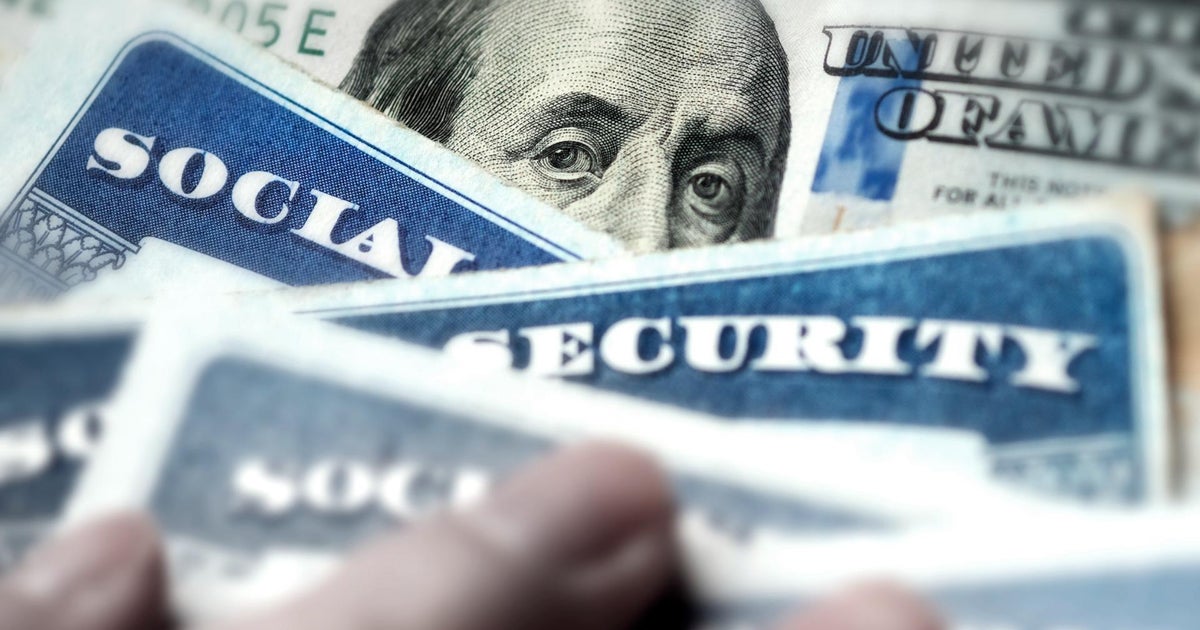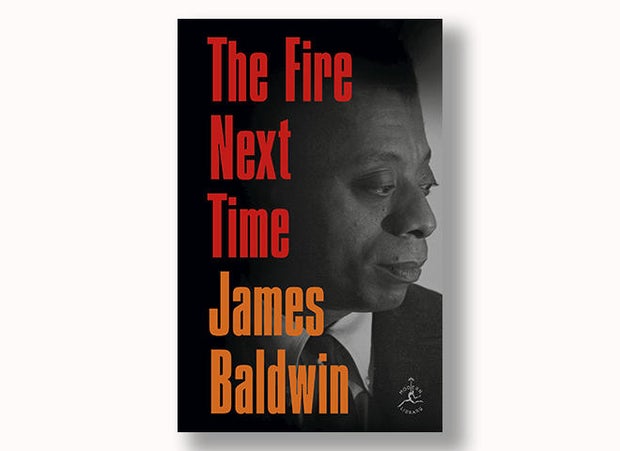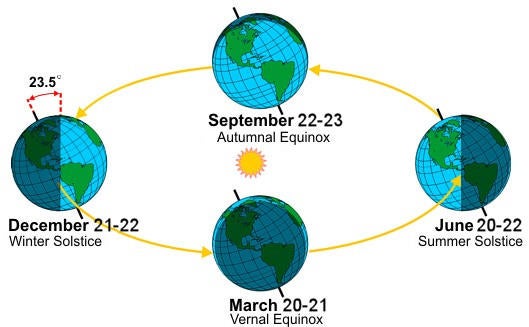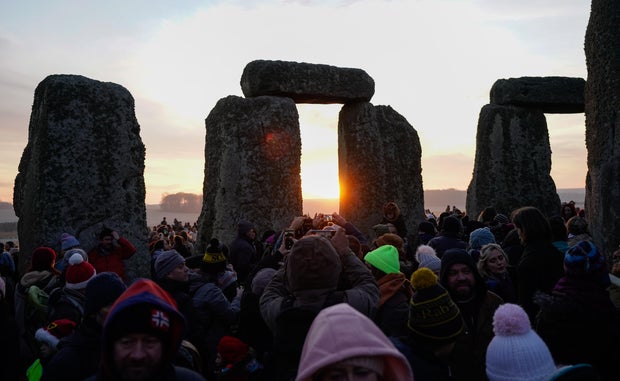CBS News
Book excerpt: “The Fire Next Time” by James Baldwin

Modern Library
We may receive an affiliate commission from anything you buy from this article.
Writer, poet and activist James Baldwin (1924-1987) was one of the leading literary voices of the civil rights movement. Through a powerful oeuvre of novels, plays and essays, he explored issues of race, class, politics and sexual identity during one of America’s most turbulent periods.
Baldwin’s essay “My Dungeon Shook,” written in the form of a letter to his young nephew, was first published in The Progressive in 1962; the following year a revised version was included in his collection “The Fire Next Time” (Modern Library). The letter is a powerful treatise on the state of racism in America – how it affects Black people whose very dignity is circumscribed by social constructs, as well as whites undermined by their lack of understanding and their feelings of fear. It richly illustrates the ironies of how race relations can dampen the humanity of all involved.
Read the essay below, and don’t miss Kelefa Sanneh’s report on the centenary of James Baldwin on “CBS Sunday Morning” August 11!
“The Fire Next Time” by James Baldwin
Prefer to listen? Audible has a 30-day free trial available right now.
“My Dungeon Shook”
Letter to My Nephew on the One Hundredth Anniversary of the Emancipation
Dear James:
I have begun this letter five times and torn it up five times. I keep seeing your face, which is also the face of your father and my brother. Like him, you are tough, dark, vulnerable, moody—with a very definite tendency to sound truculent because you want no one to think you are soft. You may be like your grandfather in this, I don’t know, but certainly both you and your father resemble him very much physically. Well, he is dead, he never saw you, and he had a terrible life; he was defeated long before he died because, at the bottom of his heart, he really believed what white people said about him. This is one of the reasons that he became so holy. I am sure that your father has told you something about all that. Neither you nor your father exhibit any tendency towards holiness: you really are of another era, part of what happened when the Negro left the land and came into what the late E. Franklin Frazier called “the cities of destruction.” You can only be destroyed by believing that you really are what the white world calls a n—–. I tell you this because I love you, and please don’t you ever forget it.
I have known both of you all your lives, have carried your Daddy in my arms and on my shoulders, kissed and spanked him and watched him learn to walk. I don’t know if you’ve known anybody from that far back; if you’ve loved anybody that long, first as an infant, then as a child, then as a man, you gain a strange perspective on time and human pain and effort. Other people cannot see what I see whenever I look into your father’s face, for behind your father’s face as it is today are all those other faces which were his. Let him laugh and I see a cellar your father does not remember and a house he does not remember and I hear in his present laughter his laughter as a child. Let him curse and I remember him falling down the cellar steps, and howling, and I remember, with pain, his tears, which my hand or your grandmother’s so easily wiped away. But no one’s hand can wipe away those tears he sheds invisibly today, which one hears in his laughter and in his speech and in his songs. I know what the world has done to my brother and how narrowly he has survived it. And I know, which is much worse, and this is the crime of which I accuse my country and my countrymen, and for which neither I nor time nor history will ever forgive them, that they have destroyed and are destroying hundreds of thousands of lives and do not know it and do not want to know it. One can be, indeed one must strive to become, tough and philosophical concerning destruction and death, for this is what most of mankind has been best at since we have heard of man. (But remember: most of mankind is not all of mankind.) But it is not permissible that the authors of devastation should also be innocent. It is the innocence which constitutes the crime.
Now, my dear namesake, these innocent and well-meaning people, your countrymen, have caused you to be born under conditions not very far removed from those described for us by Charles Dickens in the London of more than a hundred years ago. (I hear the chorus of the innocents screaming, “No! This is not true! How bitter you are!”—but I am writing this letter to you, to try to tell you something about how to handle them, for most of them do not yet really know that you exist. I know the conditions under which you were born, for I was there. Your countrymen were not there, and haven’t made it yet. Your grandmother was also there, and no one has ever accused her of being bitter. I suggest that the innocents check with her. She isn’t hard to find. Your countrymen don’t know that she exists, either, though she has been working for them all their lives.)
Well, you were born, here you came, something like fifteen years ago; and though your father and mother and grandmother, looking about the streets through which they were carrying you, staring at the walls into which they brought you, had every reason to be heavyhearted, yet they were not. For here you were, Big James, named for me—you were a big baby, I was not—here you were: to be loved. To be loved, baby, hard, at once, and forever, to strengthen you against the loveless world. Remember that: I know how black it looks today, for you. It looked bad that day, too, yes, we were trembling. We have not stopped trembling yet, but if we had not loved each other none of us would have survived. And now you must survive because we love you, and for the sake of your children and your children’s children.
This innocent country set you down in a ghetto in which, in fact, it intended that you should perish. Let me spell out precisely what I mean by that, for the heart of the matter is here, and the root of my dispute with my country. You were born where you were born and faced the future that you faced because you were black and for no other reason. The limits of your ambition were, thus, expected to be set forever. You were born into a society which spelled out with brutal clarity, and in as many ways as possible, that you were a worthless human being. You were not expected to aspire to excellence: you were expected to make peace with mediocrity. Wherever you have turned, James, in your short time on this earth, you have been told where you could go and what you could do (and how you could do it) and where you could live and whom you could marry. I know your countrymen do not agree with me about this, and I hear them saying, “You exaggerate.” They do not know Harlem, and I do. So do you. Take no one’s word for anything, including mine—but trust your experience. Know whence you came. If you know whence you came, there is really no limit to where you can go. The details and symbols of your life have been deliberately constructed to make you believe what white people say about you. Please try to remember that what they believe, as well as what they do and cause you to endure, does not testify to your inferiority but to their inhumanity and fear. Please try to be clear, dear James, through the storm which rages about your youthful head today, about the reality which lies behind the words acceptance and integration. There is no reason for you to try to become like white people and there is no basis whatever for their impertinent assumption that they must accept you. The really terrible thing, old buddy, is that you must accept them. And I mean that very seriously. You must accept them and accept them with love. For these innocent people have no other hope. They are, in effect, still trapped in a history which they do not understand; and until they understand it, they cannot be released from it. They have had to believe for many years, and for innumerable reasons, that black men are inferior to white men. Many of them, indeed, know better, but, as you will discover, people find it very difficult to act on what they know. To act is to be committed, and to be committed is to be in danger. In this case, the danger, in the minds of most white Americans, is the loss of their identity. Try to imagine how you would feel if you woke up one morning to find the sun shining and all the stars aflame. You would be frightened because it is out of the order of nature. Any upheaval in the universe is terrifying because it so profoundly attacks one’s sense of one’s own reality. Well, the black man has functioned in the white man’s world as a fixed star, as an immovable pillar: and as he moves out of his place, heaven and earth are shaken to their foundations. You, don’t be afraid. I said that it was intended that you should perish in the ghetto, perish by never being allowed to go behind the white man’s definitions, by never being allowed to spell your proper name. You have, and many of us have, defeated this intention; and, by a terrible law, a terrible paradox, those innocents who believed that your imprisonment made them safe are losing their grasp of reality. But these men are your brothers—your lost, younger brothers. And if the word integration means anything, this is what it means: that we, with love, shall force our brothers to see themselves as they are, to cease fleeing from reality and begin to change it. For this is your home, my friend, do not be driven from it; great men have done great things here, and will again, and we can make America what America must become. It will be hard, James, but you come from sturdy, peasant stock, men who picked cotton and dammed rivers and built railroads, and, in the teeth of the most terrifying odds, achieved an unassailable and monumental dignity. You come from a long line of great poets, some of the greatest poets since Homer. One of them said, The very time I thought I was lost, My dungeon shook and my chains fell off.
You know, and I know, that the country is celebrating one hundred years of freedom one hundred years too soon. We cannot be free until they are free. God bless you, James, and Godspeed.
Your uncle,
James
From “The First Next Time” by James Baldwin. Reprinted by arrangement with Modern Library, an imprint of Penguin Publishing Group, a division of Penguin Random House, LLC. Copyright © 1962, 1963 by James Baldwin. Copyright renewed 1990, 1991 by Gloria Baldwin Karefa-Smart.
Get the book here:
“The Fire Next Time” by James Baldwin
Buy locally from Bookshop.org
For more info:
CBS News
Social Security Fairness Act passes U.S. Senate

Legislation to expand Social Security benefits to millions of Americans passed the U.S. Senate early Saturday and is now headed to the desk of President Joe Biden, who is expected to sign the measure into law.
Senators voted 76-20 for the Social Security Fairness Act, which would eliminate two federal policies that prevent nearly 3 million people, including police officers, firefighters, postal workers, teachers and others with a public pension, from collecting their full Social Security benefits. The legislation has been decades in the making, as the Senate held its first hearings into the policies in 2003.
“The Senate finally corrects a 50-year mistake,” proclaimed Senate Majority Leader Chuck Schumer, a Democrat from New York, after senators approved the legislation at 12:15 a.m. Saturday.
The bill’s passage is “a monumental victory for millions of public service workers who have been denied the full benefits they’ve rightfully earned,” said Shannon Benton, executive director for the Senior Citizens League, which advocates for retirees and which has long pushed for the expansion of Social Security benefits. “This legislation finally restores fairness to the system and ensures the hard work of teachers, first responders and countless public employees is truly recognized.”
The vote came down to the wire, as the Senate looked to wrap up its current session. Senators rejected four amendments and a budgetary point of order late Friday night that would have derailed the measure, given the small window of time left to pass it.
Vice President-elect JD Vance of Ohio was among the 24 Republican senators to join 49 Democrats to advance the measure in an initial procedural vote that took place Wednesday.
“Social Security is a bedrock of our middle class. You pay into it for 40 quarters, you earned it, it should be there when you retire,” Ohio Senator Sherrod Brown, a Democrat who lost his seat in the November election, told the chamber ahead of Wednesday’s vote. “All these workers are asking for is for what they earned.”
What is the Social Security Fairness Act?
The Social Security Fairness Act would repeal two federal policies — the Windfall Elimination Provision (WEP) and the Government Pension Offset (GPO) — that reduce Social Security payments to nearly 3 million retirees.
That includes those who also collect pensions from state and federal jobs that aren’t covered by Social Security, including teachers, police officers and U.S. postal workers. The bill would also end a second provision that reduces Social Security benefits for those workers’ surviving spouses and family members. The WEP impacts about 2 million Social Security beneficiaries and the GPO nearly 800,000 retirees.
The measure, which passed the House in November, had 62 cosponsors when it was introduced in the Senate last year. Yet the bill’s bipartisan support eroded in recent days, with some Republican lawmakers voicing doubts due to its cost. According to the Congressional Budget Office, the proposed legislation would add a projected $195 billion to federal deficits over a decade.
Without Senate approval, the bill’s fate would have ended with the current session of Congress and would have needed to be re-introduced in the next Congress.
CBS News
12/20: CBS Evening News – CBS News

Watch CBS News
Be the first to know
Get browser notifications for breaking news, live events, and exclusive reporting.
CBS News
Saturday is the winter solstice and 2024’s shortest day. Here’s what to know about the official start of winter.

The 2024 winter solstice, the shortest day of the year, happens on Saturday, Dec. 21, in the Northern Hemisphere. The celestial event signifies the first day of winter, astronomically.
What is the winter solstice?
The winter solstice is the day each year that has the shortest period of daylight between sunrise and sunset, and therefore the longest night. It happens when the sun is directly above the Tropic of Capricorn, a line of latitude that circles the globe south of the equator, the National Weather Service explains.
The farther north you are, the shorter the day will be, and in the Arctic Circle, the sun won’t rise at all.
How is the day of the winter solstice determined?
The winter solstice occurs because of the Earth’s tilt as it rotates around the sun.
When the Northern Hemisphere tilts away from the sun, the nights last longer. The longest night happens on the solstice because the hemisphere is in its furthest position from the sun. That occurs each year on Dec. 21 or 22.
This year, it falls on Dec. 21 at 4:21 a.m ET, to be precise.
On the summer solstice, when the northern tilt is closest to the sun, we have the longest day, usually June 20 or 21.
National Weather Service
The solstices are not always exactly on the 21st every year because the earth’s rotation around the sun is 365.25 days, instead of 365 even.
Will days start getting longer after the winter solstice?
Yes. Each day after the solstice, we get one minute more of sunlight. It doesn’t sound like much, but after just two months, or around 60 days, we’ll be seeing about an hour more of sunlight.
When will winter officially be over in 2025?
The meteorological winter ends on March 20, 2025. Then, spring will last until June 20, when the summer solstice arrives.
How is the winter solstice celebrated around the world?
Nations and cultures around the world have celebrated the solstice since ancient times with varying rituals and traditions. The influence of those solstice traditions can still be seen in our celebrations of holidays like Christmas and Hanukkah, Britannica notes.
The ancient Roman Saturnalia festival celebrated the end of the planting season and has close ties with modern-day Christmas. It honored Saturn, the god of harvest and farming. The multiple-day affair had lots of food, games and celebrations. Presents were given to children and the poor, and slaves were allowed to stop working.
Gatherings are held every year at Stonehenge, a monumental circle of massive stones in England that dates back about 5,000 years. The origins of Stonehenge are shrouded in mystery, but it was built to align with the sun on solstice days.
Andrew Matthews/PA Images via Getty Images
The Hopi, a Native American tribe in the northern Arizona area, celebrate the winter solstice with dancing, purification and sometimes gift-giving. A sacred ritual known as the Soyal Ceremony marks the annual milestone.
In Peru, people honor the return of the sun god on the winter solstice. The ancient tradition would be to hold sacrificial ceremonies, but today, people hold mock sacrifices to celebrate. Because Peru is in the Southern Hemisphere, their winter solstice happens in June, when the Northern Hemisphere is marking its summer solstice.
Scandinavia celebrates St. Lucia’s Day, a festival of lights.
The “arrival of winter,” or Dong Zhi, is a Chinese festival where family gathers to celebrate the year so far. Traditional foods include tang yuan, sweet rice balls with a black sesame filling. It’s believed to have its origins in post-harvest celebrations.
Researchers stationed in in Antarctica even have their own traditions, which may include an icy plunge into the polar waters. They celebrate “midwinter” with festive meals, movies and sometimes homemade gifts.




